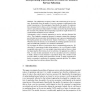Free Online Productivity Tools
i2Speak
i2Symbol
i2OCR
iTex2Img
iWeb2Print
iWeb2Shot
i2Type
iPdf2Split
iPdf2Merge
i2Bopomofo
i2Arabic
i2Style
i2Image
i2PDF
iLatex2Rtf
Sci2ools
135
Voted
ICSOC
2010
Springer
2010
Springer
Incorporating Expectations as a Basis for Business Service Selection
Abstract. The collaborative creation of value is the central tenet of services science. In particular, then, the quality of a service encounter would depend on the mutual expectations of the participants. Specifically, the quality of experience that a consumer derives from a service encounter would depend on how the consumer’s expectations are refined and how well they are met by the provider during the encounter. We postulate that incorporating expectations ought therefore be a crucial element of business service selection. Unfortunately, today’s technical approaches to service selection disregard the above. They emphasize reputation measured via numeric ratings that consumers provide about service providers. Such ratings are easy to process computationally, but beg the question as to what the raters’ frames of reference, i.e., expectations. When the frames of reference are not modeled, the resulting reputation scores are often not sufficiently predictive of a consumer’s sa...
Related Content
| Added | 26 Jan 2011 |
| Updated | 26 Jan 2011 |
| Type | Journal |
| Year | 2010 |
| Where | ICSOC |
| Authors | Adel M. ElMessiry, Xibin Gao, Munindar P. Singh |
Comments (0)

